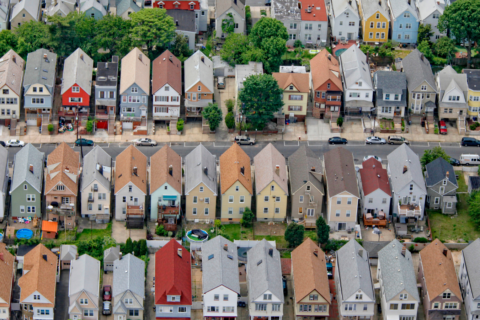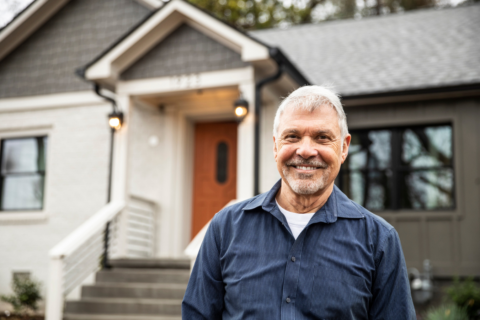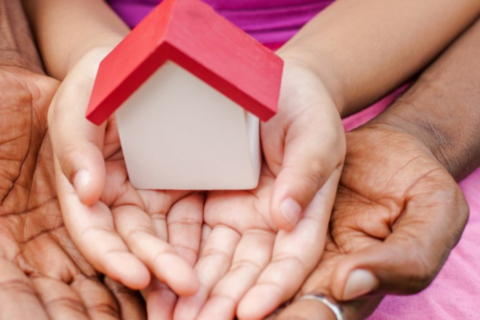Mental health is an essential component of overall health and well-being, shaping how we cope with stress, build relationships, and operate at work, in school, and in our communities. While rising rates of mental health challenges predate COVID-19, heightened stress, grief, social isolation, and economic insecurity due to the pandemic has exacerbated these challenges. Our transition from Mental Health Awareness Month in May to National Healthy Homes Month in June offers a timely opportunity to recognize how housing can support or harm our mental health and well-being.
The Importance of Housing on Mental Health
One determinant of our health is access to safe, stable, and affordable housing. As pediatrician Dr. Meagan Sandel has said, “a stable, affordable home can act like a vaccine, providing multiple long-lasting benefits on both the individual level and the community level.” Conversely, a lack of access to safe, stable, and affordable housing is harmful to health. Multiple housing factors, such as poor ventilation, pests, crowding, forced moves, and neighborhood environment, are associated with infectious and chronic diseases. The linkages between health and housing are not limited to physical health, but impact mental health and well-being as well. For example, a growing body of evidence demonstrates that being evicted is associated with elevated levels of stress and worsened mental health outcomes. In addition, living in unaffordable housing is associated with poorer self-rated health, hypertension, and mental health. Further, mental health challenges can be a contributing factor to housing instability and homelessness.
The Impact of Poor Housing Quality on Mental Health
Housing quality, or the physical conditions of a person’s home, can have particularly consequential impacts on our mental health and well-being. In addition to causing physical injuries, substandard housing can harm children’s development and contribute to psychological distress. For example:
- Exposure to environmental hazards found inside the home, such as lead, can cause irreversible neurological damage. Even at low levels, childhood lead exposure can result in behavioral problems, including attention-deficit/hyperactivity disorder (ADHD), and may even negatively impact adult mental health.
- Poor quality housing is associated with stress, anxiety, depression; emotional and behavioral problems; and worse academic performance in children.
- Living in housing with substandard conditions can also contribute to increased housing instability, which is independently associated with adverse mental health, as well as the postponement of necessary health care and material hardship.
Despite these consequences, an estimated 45 million homes in the United States have one or more health or safety hazards, such as leaking roofs, broken windows or appliances, ventilation or insulation issues, pests, and lack of adequate heat, hot water or light. And due to the United States’ history of structural racism and discrimination, these risks related to poor housing quality are especially acute for Black, Indigenous, and other people of color (BIPOC) and people in communities with low income.
Local Housing Policy Solutions That Can Support Mental Health
Just as laws and policies have played a central role in creating housing and mental health inequities, they can also be leveraged to correct those harms. Policymakers and health advocates can push back against laws and policies that uphold drivers of housing inequity such as structural racism; income inequality and poverty; and other factors that drive adverse mental health outcomes. For example:
- Proactive rental inspection programs can help jurisdictions identify potential hazards before they cause permanent health harms and prioritize code enforcement activities in areas with greater housing instability and need;
- Housing rehabilitation assistance programs can help low-income property owners afford critical repairs, such as lead paint abatement, and preserve existing affordable housing; and
- Zoning reforms can permit, require, and incentivize the construction of affordable and multifamily housing, which can in turn provide BIPOC and low-income households with greater access to healthy housing options.
It is hard to overstate the benefits of safe, stable, and affordable housing as fundamental to mental health and well-being. Working together, housing and mental health experts, government officials, and community members can begin addressing some of the social determinants of poor health by advancing housing solutions that remedy historic harms and support mental health and well-being.
Take the Healthy Housing Local Action Challenge!
Your municipality is invited to take the Healthy Housing Local Action Challenge. The initiative supports and celebrates cities, towns, and villages working to promote healthier homes through improving housing for residents. If your municipality is interested in taking the Challenge, please visit the initiative site to learn more. NLC is excited to partner with you on your local healthy housing work! Please email healthyhousing@nlc.org if you have any questions.
By Greg Miao, senior attorney & Melissa Marichal Zayas, attorney, ChangeLab Solutions
ABOUT THE AUTHORS: Through the NLC Healthy Housing Local Action Challenge, ChangeLab Solutions is providing support and technical assistance to cities, towns, and villages who have taken the Challenge, in partnership with the National Center for Healthy Housing, the Green & Healthy Homes Initiative (GHHI), and the Center for Community Progress. ChangeLab Solutions is a nonprofit organization that provides legal information on matters relating to public health. The legal information in this document does not constitute legal advice or legal representation. For legal advice, readers should consult a lawyer in their state. www.changelabsolutions.org/healthy-neighborhoods/housing







